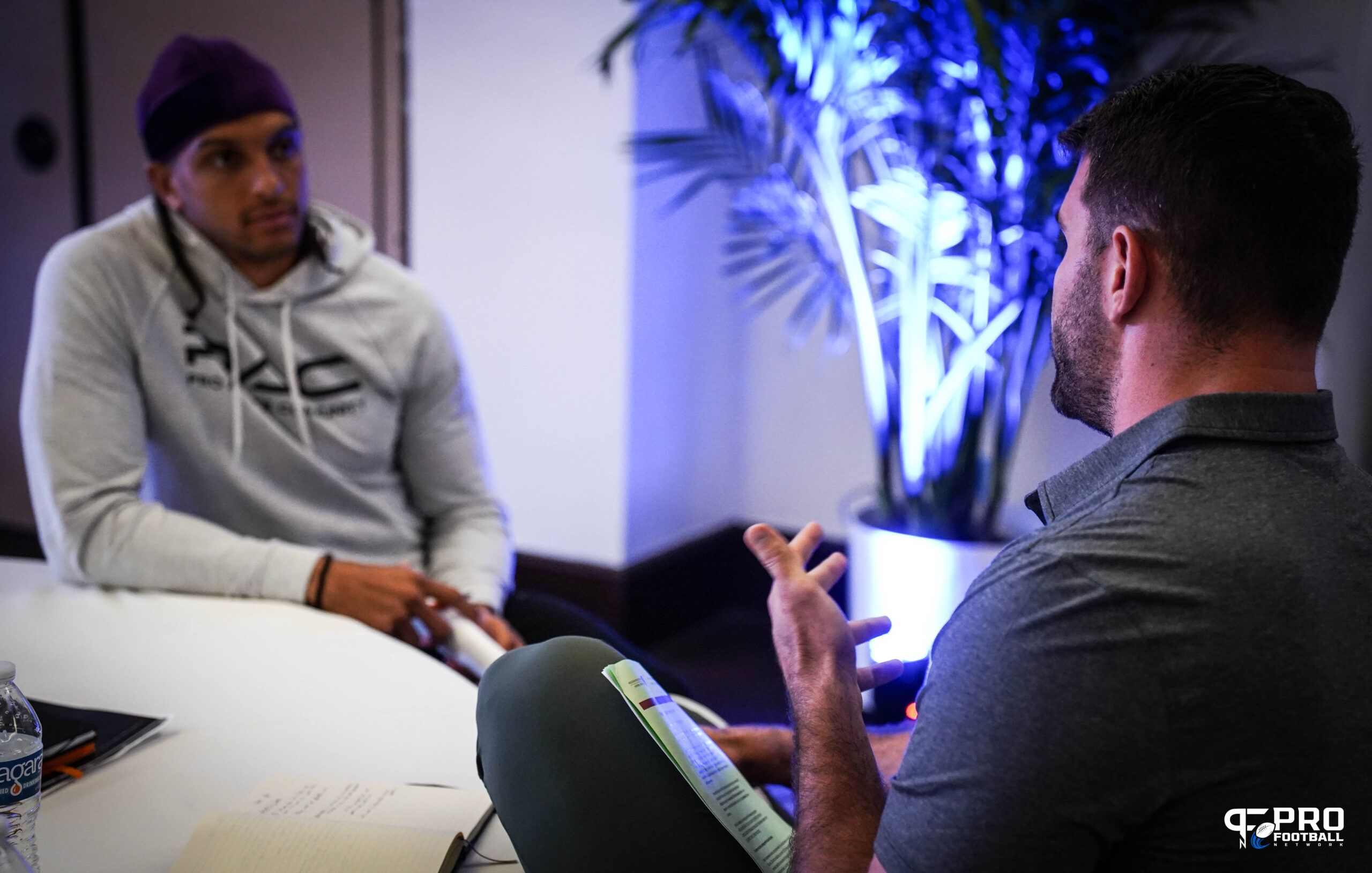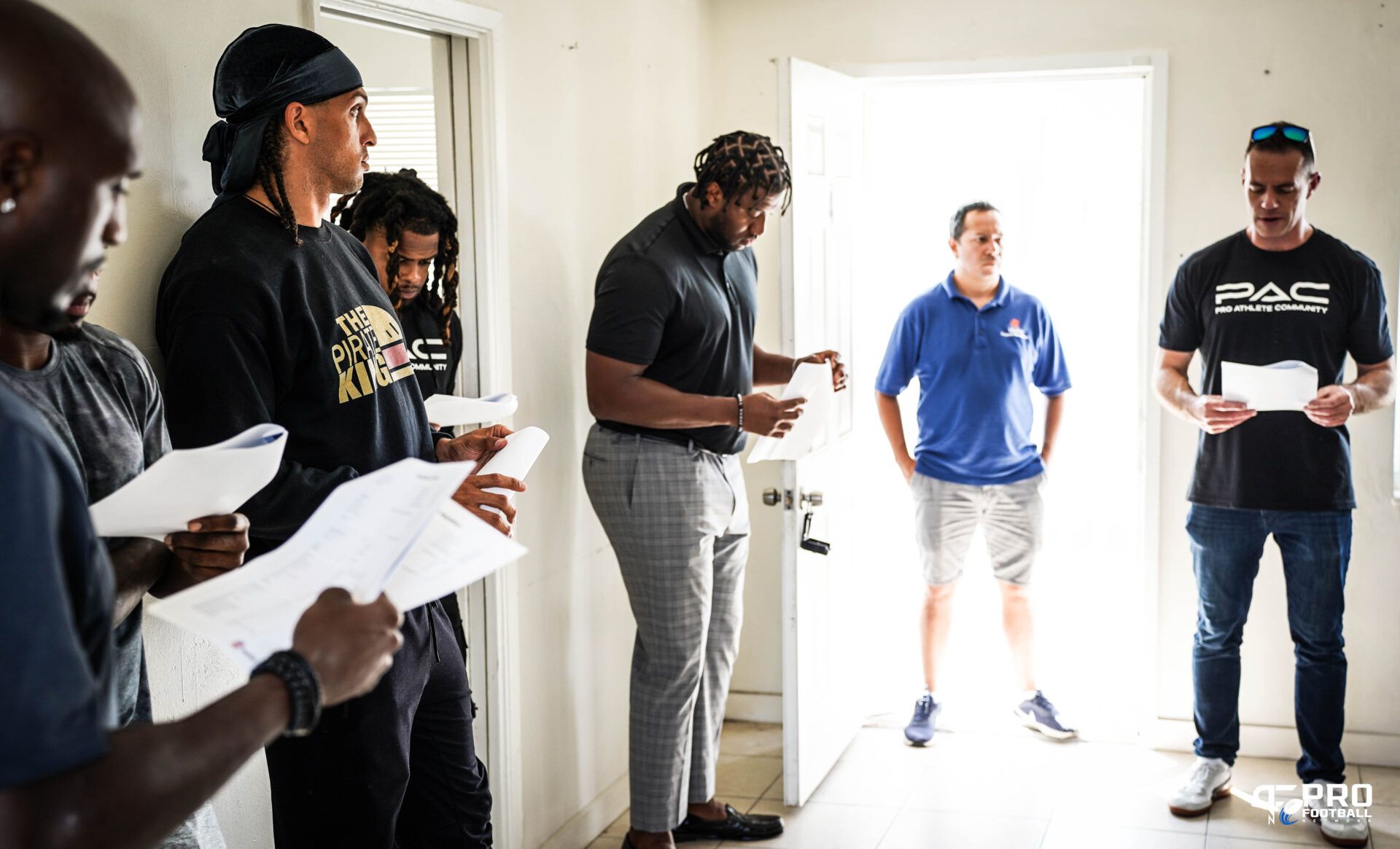Over the course of his career, Mack Hollins has earned $6.4 million, with another $2.5 million scheduled to come to him by way of the Atlanta Falcons, with whom he recently signed a one-year deal. Though it’s significantly more than most people make, it’s a pittance compared to the career earnings of household NFL names. Nevertheless, Hollins is finding himself giving financial advice to incoming rookies.
Nestled in the sprawling residential communities of Fort Lauderdale, surrounded by the city’s canals, is Hollins’ first real estate investment — a modest apartment that Hollins hopes to convert into two units, both eligible for Section 8 housing vouchers. The purchase was well within Hollins’ budget, but it took Hollins three years of planning, research, and hesitation.
Mack Hollins Understands Post-NFL Life Even Before Retirement
When Hollins was injured in Philadelphia, he was struck with an alienation familiar to many NFL players — he was in the facility, going through a routine, but he was disconnected from his teammates and bored out of his mind.
“It’s almost like getting into this zombie mode,” Hollins told Pro Football Network at the Pro Athlete Community Business Combine, an event designed to prepare players for their post-NFL careers. “You’re there, but you’re not really there. If you didn’t have to go and sweat, go to practice, you just feel like you’re kind of … not an outcast, but … it’s easy to be like mentally not be where you need to be.”
To combat this, Hollins started to read.
“When I started reading, it was hard,” he said. “It was hard to start reading. Five pages — that was the most I could do. But then I just kept going, kept going until the point I was reading 400-500 pages a week.”
“I never used to read,” he said. “I used to think it was a waste of time — why not just watch the movie? It’s way better.”
After his reading took off, he wanted to share that love of books and reading with the world. His initial disconnect from books and reintroduction to reading was transformative, and he wanted that feeling to take off. That’s how he kickstarted his social media presence, sharing his reads on his Instagram account with series like “Mack Book Mondays” and “Fast Fact Fridays.”
“The goal was to make reading sound cool, because ‘oh, an NFL player reads, that’s cool,'” he said about starting Mack Book Mondays. “And then, about two and a half years ago, I got into Fast Fact Fridays, I think really stemmed from just wanting to do a little more. Like the reading thing was cool, but I think just the way people are, they want something more engaging, fun.”
Those short videos became pretty popular, drawing in an audience often unfamiliar with his football career or connections. Eagles fans who connected to his Instagram videos when he was first starting out in the league would remain fans of Hollins as he signed with other teams.
With 121 straight Fast Fact Fridays, Hollins has developed a consistent content schedule. That’s been a big part of his success, as is his quick editing style that immediately fit in with the content already popular on the platform.
At first glance, Hollins doesn’t seem like the kind of person who has that kind of consistent discipline. He walks barefoot everywhere he’s allowed to and sometimes where he isn’t. His laid-back demeanor and casual conversation style belie the careful planning and purpose behind everything he does.
As he says, “Football is something that I do, but that’s not who I am.”
That’s why his Fast Fact Fridays have a broad focus — whether it’s carpentry, animals, food, driving, or general science. “I loved Bill Nye when I was a kid,” he said. “Like when the teacher would bring out the TV on a cart with the VHS underneath, and it was Bill Nye, it was the best day of the year. I think that’s something that’s always been cool to me.”
“And if I can do that for one kid or change their perspective on life, that there’s outlets other than sports,” he said, “then I think I did alright.”

Mack Hollins Has a Plan
More than just developing a social media presence, Hollins wants to set himself up for life. “I don’t want to play football forever,” Hollins said. “There’s so many other things that are available to do in this world that are so enjoyable.”
“I really do enjoy football,” he said. “So, I don’t want to stop anytime soon. But I know that even if I play for another 10 years — most likely not — I’d be almost 40 years old. There’s still plenty of life to live, and so what am I gonna do then? I’m gonna talk about how I used to play football with people? No, like, why not take that same mindset and go do something else with it?”
For Hollins, he took that into real estate. “Real estate has always been something that I’ve attached myself to, and that’s kind of what I’ve been drawn to. Real estate’s tangible,” he said, in contrast to stocks and other types of investing. “If I drive down the road, like ‘Oh, I own that property.’ There’s a sense of pride in that. I worked hard to get this, and my kids are gonna have that.”
Hollins’ plan is to immediately maintain his lifestyle after his career ends. “I’ve really started to enjoy learning more and more. Just the fact that we have a lot of liquid capital, putting it to use somewhere where we can make a return to try to offset the drop-off that we’re going to have when we’re done,” Hollins said.
“Because at some point,” he pointed out, “if I’m making the minimum, which is $600,000 now or something like that. If our stock is here, we’re going to zero; how can I offset that? How can I get my real estate or whatever else off-the-field income as close to 600 as I can? So that drop-off doesn’t hit my family and kids.”
The difficulty is in transitioning his work ethic on the field into another endeavor entirely.
“I still am struggling because I’m still playing; I’m still trying to find ‘how do I fit it into my schedule.’ Because it’s not really a schedule,” he said. “It’s a lifestyle.”
For Hollins, waking up early to work out, attending meetings, and studying the playbook doesn’t feel like work. It feels like life. He had to take his routine and fit it into the football lifestyle that he knows.
“I have everything scheduled out football-wise,” he said. “So, taking those blocks of ‘OK, I was lifting weights here. Now that’s studying this market.’ The sprint training, running training, now that’s trying to get my real estate license. Three hours that were practice, now that’s three hours towards going to make calls and doing Zooms.”
After some experience as a real estate investor, he still hasn’t absorbed what that schedule looks like.
“It’s still tough to do; I’d rather be lifting weights and running because that’s what my body is used to doing. Like I said with the reading, it took some time to get used to it and feel comfortable doing it. Just like anything. We’ve done football so long that we forget what it felt like to not be good at it.”
But that doesn’t mean he thinks it’s a big barrier. To him, athletes are uniquely suited to succeed after their professional careers are over.
“The man-hours [football players] put in, even in college, that’s an absurd amount of time. To be a real estate professional, you need 700 hours. That’s less than two hours a day for a year. If you did five hours a day, you’d be a master in no time,” he said. “An NFL day’s even longer. Now, obviously, if you spent eight hours, you can go five hours studying and [spend] two or three hours going to look at the property. Guys don’t always look at things that way.”
“How long do you study the playbook? A long time. How long do you train your body to make sure you’re ready? Training your body is the same as training your mind. Real estate, whatever other profession you do, if you spent that amount of time to be successful,” Hollins said.
“But guys don’t always put two and two together,” the wide receiver said. “They don’t think about it that way. But once it clicks for them. That’s why you see like a lot of former athletes who are successful because they just take the same mindset and are just like, ‘alright, I’m just going to go be the best at that.’ That’s a hard transition thing to do, but once you can do it, it’s easy.”

Mack Hollins Wants To Be the Idiot in the Room
It’s not just reframing their understanding of a workday that matters to football players. It’s being in a completely unfamiliar environment with no knowledge of how to progress. They went from an area of expertise to an area where they don’t know anything.
Getting the body and brain used to a different type of lifestyle can be tough. But the ego takes blows, too. “We’ve done football so long that we forget what it felt like to not be good at it. Not to say that you don’t come to the NFL nervous about certain things. But nobody’s ever nervous in their capabilities or their understanding,” he said. “I don’t think anybody comes in and says, ‘I don’t understand how this game works.'”
“But real estate or anything new, you do,” said Hollins. “When was the last time I was afraid of not knowing something? A long time because I haven’t had to do anything like that before for a long time.”
“With real estate, all this stuff is new,” he said. “I look like the idiot in the room. So you have to get rid of that fear and not care what other people think. Don’t be afraid to ask questions. You’re new in the room. You don’t owe anybody anything; nobody owes you anything. Go out there, and if you’re the new guy, ask. You got to be open to … open to new ideas because you’re not accustomed to them.”
Hollins never led his team in receiving yards or found himself as a team captain. But entering his seventh year, he’s a veteran. And rookies lean on him for advice. While most of his time spent talking to younger players is about football, a lot of it is about post-career life.
“It’s definitely been great to see young guys saying, ‘Hey, why are you doing this? Why are you doing that?’ You can tell which guys are more serious than others, obviously, right? We can sit down actually have a conversation,” he said. “It’s cool. Every locker room is different, but it’s definitely cool to kind of be like a word of wisdom.”
If it all plays out correctly, Hollins might envision his life as a success story fit for a movie. Or something else.
“I’ve totally flipped. The books are definitely better.”

